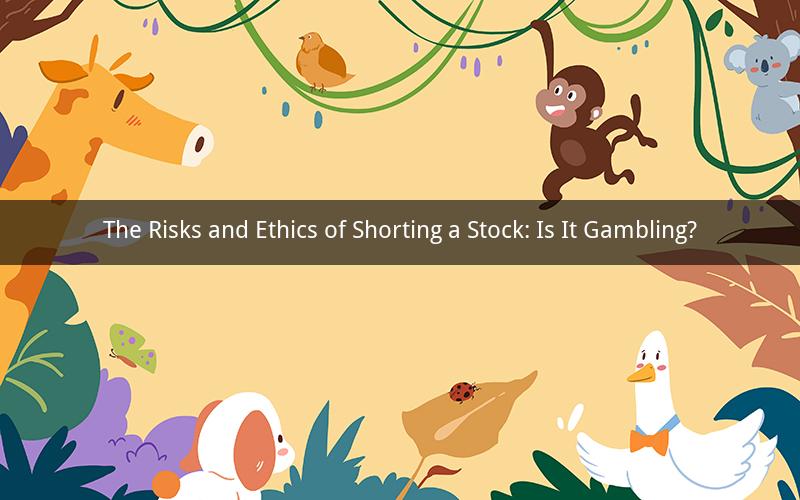
Introduction:
Shorting a stock has become a popular strategy among investors, but is it merely a form of gambling? In this article, we will explore the risks and ethics associated with shorting a stock, and whether it can be considered as gambling.
1. Understanding Shorting a Stock:
Shorting a stock involves borrowing shares from a broker and selling them at the current market price. The goal is to buy back the shares at a lower price in the future, thereby making a profit on the difference. This strategy is often used when an investor expects a stock to decline in value.
2. Risks of Shorting a Stock:
While shorting a stock can be profitable, it also comes with significant risks. Here are some of the key risks involved:
a. Unlimited Loss Potential: Unlike buying a stock, where the maximum loss is limited to the amount invested, shorting a stock can result in unlimited losses. This is because the price of a stock can theoretically rise indefinitely, leading to substantial losses for the short seller.
b. Margin Requirements: Shorting a stock typically requires a margin account, which means investors must put up cash or securities as collateral. This can result in higher transaction costs and the potential for margin calls, where additional funds are required to maintain the position.
c. Market Volatility: Shorting a stock can be risky during periods of high market volatility, as the price of the stock can fluctuate rapidly. This can make it difficult for short sellers to exit their positions at a desired price.
3. Ethical Considerations:
The ethics of shorting a stock are a subject of debate. Here are some ethical concerns associated with shorting:
a. Manipulating Stock Prices: Critics argue that short sellers can manipulate stock prices by spreading negative rumors or engaging in other unethical practices. This can harm the reputation of the company and its shareholders.
b. Impact on the Company: Shorting a stock can put pressure on the company's management and shareholders, potentially leading to negative consequences such as layoffs or a loss of investor confidence.
c. Market Efficiency: Short sellers can contribute to market efficiency by identifying overvalued stocks and driving their prices down. However, some argue that short sellers may also contribute to market instability by creating uncertainty and volatility.
4. Is Shorting a Stock Gambling?
Whether shorting a stock is considered gambling depends on the perspective. Here are some factors to consider:
a. Skill and Knowledge: Shorting a stock requires a thorough understanding of market dynamics, financial analysis, and risk management. In this sense, it can be seen as a form of investing rather than gambling.
b. Luck and Uncertainty: Like any investment, shorting a stock involves an element of uncertainty and luck. However, successful short sellers often rely on research and analysis rather than relying solely on luck.
c. Time and Effort: Shorting a stock requires significant time and effort to identify potential opportunities and manage the associated risks. This distinguishes it from gambling, which is often seen as a leisure activity.
5. Related Questions and Answers:
Q1: Can shorting a stock be profitable?
A1: Yes, shorting a stock can be profitable if the investor correctly predicts that the stock will decline in value.
Q2: What are the main risks associated with shorting a stock?
A2: The main risks include unlimited loss potential, margin requirements, and market volatility.
Q3: Is shorting a stock ethical?
A3: The ethics of shorting a stock are a subject of debate, with concerns about manipulating stock prices and impacting the company's reputation.
Q4: Can shorting a stock be considered gambling?
A4: Whether shorting a stock is considered gambling depends on the perspective, but it often requires skill, knowledge, and time, which distinguishes it from gambling.
Q5: How can investors mitigate the risks of shorting a stock?
A5: Investors can mitigate the risks of shorting a stock by conducting thorough research, diversifying their portfolio, and managing their margin requirements effectively.
Conclusion:
Shorting a stock is a complex strategy with both risks and potential rewards. While it can be considered a form of investing, the element of uncertainty and luck involved raises questions about whether it can be classified as gambling. Understanding the risks, ethical considerations, and the factors that differentiate shorting from gambling is crucial for investors who choose to engage in this strategy.